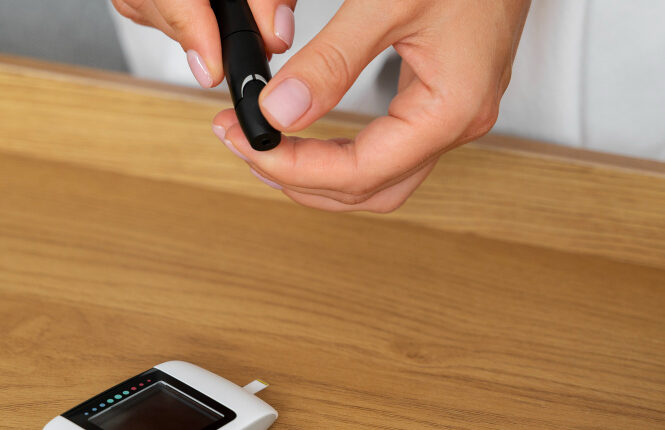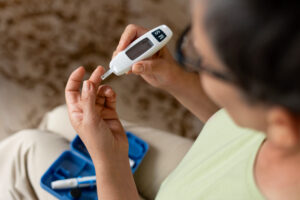The relationship between blood sugar levels and sleep is intricate, highlighting the importance of managing both for optimal health. Blood sugar, or glucose, serves as the body’s primary energy source. Its levels can influence how well you fall and stay asleep, while poor sleep can, in turn, disrupt glucose regulation. Let’s delve into how these two aspects of health interact and what you can do to improve both.
The Connection Between Blood Sugar and Sleep
Blood sugar levels fluctuate throughout the day and night, influenced by food intake, physical activity, and even stress. During sleep, the body naturally lowers glucose levels to conserve energy. However, irregularities in this process can lead to sleep disturbances, which are common in people with conditions like diabetes or insulin resistance.
High Blood Sugar (Hyperglycemia) and Sleep
Elevated blood sugar levels, often caused by excessive carbohydrate intake or inadequate insulin response, can make falling asleep difficult. Hyperglycemia may lead to:
- Increased Urination: High glucose levels force the kidneys to work harder, resulting in frequent nighttime bathroom trips.
- Restlessness: Elevated blood sugar can create a jittery sensation, disrupting the ability to relax.
Low Blood Sugar (Hypoglycemia) and Sleep
On the other end of the spectrum, low blood sugar can also interfere with restful sleep. When glucose levels drop too low, the body releases stress hormones like cortisol and adrenaline, which can:
- Wake You Up Suddenly: These hormones signal your body to restore glucose levels, often interrupting sleep.
- Cause Night Sweats or Palpitations: Symptoms of hypoglycemia during sleep include sweating, shaking, or a racing heart.
How Sleep Affects Blood Sugar Regulation
Sleep plays a crucial role in maintaining healthy blood sugar levels. Poor sleep or insufficient rest can impair the body’s ability to use insulin effectively, leading to higher blood sugar levels over time.
Sleep Deprivation and Insulin Resistance
When you don’t get enough sleep, your body becomes less sensitive to insulin, the hormone responsible for regulating blood sugar. This can result in:
- Elevated Fasting Glucose Levels
- Increased Risk of Type 2 Diabetes
Obstructive Sleep Apnea and Blood Sugar
Obstructive sleep apnea (OSA), a condition characterized by repeated interruptions in breathing during sleep, is closely linked to blood sugar imbalances. OSA increases stress hormones, which can elevate glucose levels and worsen insulin resistance.
Tips to Balance Blood Sugar Levels for Better Sleep
Maintaining stable blood sugar levels can significantly improve your sleep quality. Here are some effective strategies:
1. Eat Balanced Meals Before Bed
Avoid heavy meals or foods high in refined sugar close to bedtime. Opt for a balanced snack combining protein, healthy fats, and complex carbohydrates, such as:
- A handful of nuts
- Greek yoghurt with berries
- Whole-grain crackers with cheese
2. Exercise Regularly
Regular physical activity helps your body use insulin more effectively, stabilizing blood sugar levels. However, avoid vigorous exercise right before bed as it may disrupt sleep.
3. Manage Stress Levels
Stress increases cortisol, which can elevate blood sugar levels. Practices like meditation, deep breathing, or gentle yoga can calm your mind and help regulate glucose.
4. Stick to a Consistent Sleep Schedule
Going to bed and waking up at the same time each day improves overall sleep quality and supports healthy blood sugar regulation.
5. Monitor Blood Sugar Levels
For individuals with diabetes or prediabetes, tracking blood sugar levels can help identify patterns and prevent nighttime fluctuations.
When to Seek Medical Advice
If you experience persistent sleep disturbances or suspect that blood sugar imbalances are affecting your rest, consult a healthcare professional. They may recommend blood tests or additional monitoring to better understand your glucose levels and their impact on your sleep.
Conclusion
The relationship between blood sugar levels and sleep underscores the interconnected nature of our health. High or low glucose levels can disrupt sleep patterns, while poor sleep can worsen blood sugar regulation, creating a vicious cycle. By adopting a balanced diet, engaging in regular exercise, and maintaining a consistent sleep routine, you can take meaningful steps toward better health. Prioritizing both sleep and blood sugar management will not only enhance your nightly rest but also improve your overall well-being.










